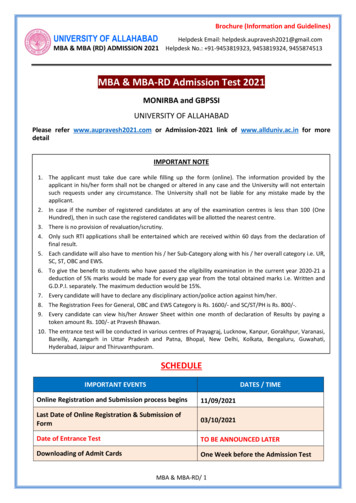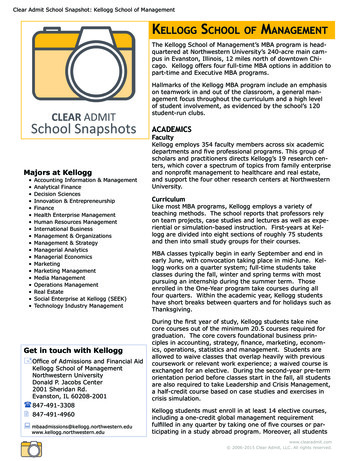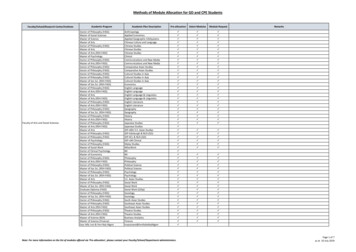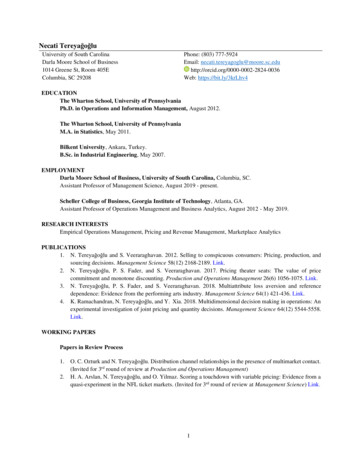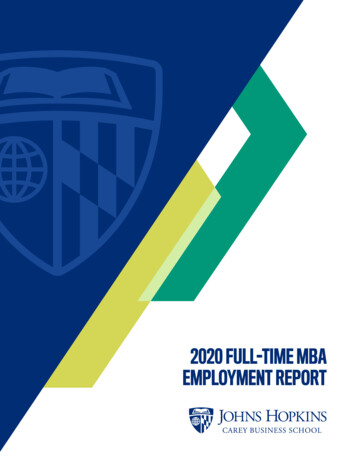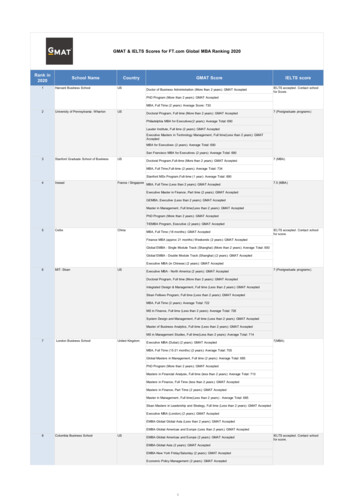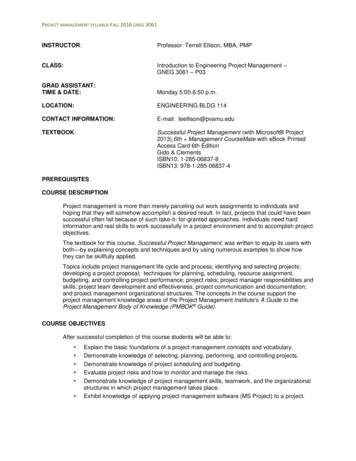
Transcription
PROJECT MANAGEMENT SYLLABUS FALL 2016 GNEG 3061INSTRUCTOR:Professor: Terrell Ellison, MBA, PMPCLASS:Introduction to Engineering Project Management –GNEG 3061 – P03GRAD ASSISTANT:TIME & DATE:Monday 5:00-6:50 p.m.LOCATION:ENGINEERING BLDG 114CONTACT INFORMATION:E-mail: teellison@pvamu.eduTEXTBOOK:Successful Project Management (with Microsoft Project2013),6th Management CourseMate with eBook PrintedAccess Card 6th EditionGido & ClementsISBN10: 1-285-06837-8ISBN13: 978-1-285-06837-4PREREQUISITESCOURSE DESCRIPTIONProject management is more than merely parceling out work assignments to individuals andhoping that they will somehow accomplish a desired result. In fact, projects that could have beensuccessful often fail because of such take-it- for-granted approaches. Individuals need hardinformation and real skills to work successfully in a project environment and to accomplish projectobjectives.The textbook for this course, Successful Project Management, was written to equip its users withboth—by explaining concepts and techniques and by using numerous examples to show howthey can be skillfully applied.Topics include project management life cycle and process; identifying and selecting projects;developing a project proposal; techniques for planning, scheduling, resource assignment,budgeting, and controlling project performance; project risks; project manager responsibilities andskills; project team development and effectiveness; project communication and documentation;and project management organizational structures. The concepts in the course support theproject management knowledge areas of the Project Management Institute's A Guide to theProject Management Body of Knowledge (PMBOK Guide).COURSE OBJECTIVESAfter successful completion of this course students will be able to: Explain the basic foundations of a project management concepts and vocabulary.Demonstrate knowledge of selecting, planning, performing, and controlling projects.Demonstrate knowledge of project scheduling and budgeting.Evaluate project risks and how to monitor and manage the risks.Demonstrate knowledge of project management skills, teamwork, and the organizationalstructures in which project management takes place.Exhibit knowledge of applying project management software (MS Project) to a project.
PROJECT MANAGEMENT SYLLABUS FALL 2016 GNEG 3061GRADINGGrading for the course is based 50% on individual assignments and 50% on team assignmentsas indicated below. Individual (50%)o 10% Part 1 Quizo 10% Part 2 examo 15% Final examo5% Individual homework assignmentso 10% AttendanceTeam (50%)o 10% Homeworko 20% Project plano 20% Project Case StudiesGradeMeaningPercentageAExcellent93 - 100A-90 - 92.99B 87 - 89.99BGood83 - 86.99B-80 - 82.99C 77 - 79.99CSatisfactory70 - 76.99DPoor60 - 69.99FFailureLess than 60PROJECT REQUIREMENTSProject deliverables are to be submitted as a team. Submissions of the project deliverables will beevaluated by the team and by the other teams. An evaluation of the process followed by the teamis to be submitted to the discussion board. The teams are to comment on other team's process.Deliverable 1:The project team prepares an RFP for a project that will be responded to byanother project team. Submit a paragraph explanation of the team's process todevelop the RFP. Comment on the other teams' RFP process statements in thediscussion board.Deliverable 2:The project team prepares a proposal for a project described in the RFPdeveloped by another project team. Submit a paragraph explanation of theteam's process followed to develop the proposal. Comment on the other teams'proposal process statements in the discussion board.Deliverable 3:The project team produces the project plan including a work breakdownstructure, a responsibility assignment matrix, a detailed list of tasks (20-40 tasks),a network diagram, the project schedule with durations, a Gantt chart, the critical
PROJECT MANAGEMENT SYLLABUS FALL 2016 GNEG 3061path, a resource utilization report, a report of the total project cumulativebudgeted cost, and a risk assessment matrix. Project teams are encouraged touse Microsoft Project for their plan. The project team will submit weekly projectprogress reports. With each of the project submissions as shown in the ClassSchedule, submit a paragraph explanation of the team's process to develop theproject submission to the discussion board. Comment on the other teams'process statements in the discussion board.Deliverable 4:The project team prepares and presents a final report including ways to reducethe overall project duration, an executive summary of the project, a list of lessonslearned, and a PowerPoint presentation that is presented to the class. This maybe completed by using video of each member of the team presenting part of thefinal report. The presentation time is to be 10 - 15 minutes and include all teammembers.CLASS SCHEDULELessonTopicsAssignments1Project management life cycle andprocessChapter 1, Initiating a Project2Identifying and selecting projectsChapter 2, Identifying and SelectingProjectsCreate a project RFP for the team project.3Developing a project proposalChapter 3, Developing Project ProposalsCreate a project proposal for the teamproject.Part 1 Quiz last 10 min of class 1-3Select teamsHomework due:Chapter 2 – Question 1-134Techniques for planning a projectChapter 4, Defining Scope, Quality,Responsibility, and Activity SequenceCreate a work breakdown structure, aresponsibility assignment matrix, adetailed list of tasks (20-40 tasks), anda network diagram for team project.Appendix Microsoft Project3Homework due:Chapter 3 – Case Study 1 Q 1-4Case Study 2 Q 1-45Techniques for scheduling a projectChapter 5, Developing the ScheduleProduce a schedule showing theduration, earliest start and finish times,latest start and finish times, and totalslack for each task; a Gantt chart, andthe critical path for the team project.Homework due:Chapter 4 Case Study 1 Q 1-5Case Study 2 Q 1-5
PROJECT MANAGEMENT SYLLABUS FALL 2016 GNEG 3061LessonTopicsAssignments6Techniques for resource assignment aprojectChapter 6, Resource UtilizationAssign resources and work times,manage over allocations, and producea resource utilization report for theteam project.7Techniques for budgeting a projectChapter 7, Determining Costs, Budget,and Earned ValueEnter project costs and produce a graphfor the total project cumulativebudgeted costs for the team project.8Techniques for assessing andmanaging project risks for a projectChapter 8, Managing RiskDevelop a risk assessment matrix for theteam project.9Techniques for controlling projectperformanceChapter 9, Closing the ProjectIdentify lessons learned for the project.10Project manager responsibilities andskillsChapter 10, The Project ManagerDetermine the roles and responsibilitiesof the project manager in the teamproject.Exam11Project team development andeffectivenessChapter 11, The Project TeamEvaluate the effectiveness of the teamand the team meetings for the teamproject.12Project communication anddocumentationChapter 12, Project Communication andDocumentationEvaluate the project communications forthe team project.13Project management organizationalstructuresChapter 13, Project ManagementOrganizational Structures14Final Review and ExamProject PresentationFinal examCOURSE POLICIESAccommodating DisabilitiesWe welcome students with disabilities into the educational programs. If you have a disabilityrelated need for reasonable academic adjustments in this course, contact the instructor.In order to receive consideration for course accommodations, you must contact DisabilityServices, and provide documentation (see the documentation guidelines). Disability Services willprovide a letter identifying appropriate academic adjustments. Please share this letter and
PROJECT MANAGEMENT SYLLABUS FALL 2016 GNEG 3061discuss the adjustments with your instructor as early in the course as possible. You must contactDisability Services and request academic adjustment letters at the beginning of each semester.
PROJECT MANAGEMENT SYLLABUS FALL 2016 GNEG 3061AttendanceAttendance is critical to the success of the individual student. Each student will be allowed 2excused absence before deductions are made from your grade. On the 3rd absence one gradededuction will be taken.Participation in the class discussions will be evaluated for quality and quantity. Quizzes andexams will be a contributing factor to final grades.Participation in the class presentation for the project team is mandatory.The only allowed excused absences are for: Participation in a documented official university function that does not permit theparticipant to attend a class meeting (e.g., participation on athletic team, field trip, etc.) Severe illness (this does not include scheduled medical appointment or driving others tothe doctor), a hospital stay, or a doctor's excuse stating that it is impossible for participantto attend class meeting Death in immediate family (parent, grandparent, sibling, or child) Required appearance in court Personal situations that are approved by the instructor in advance of the time theparticipant will be absentThe instructor must be informed in advance of all such above absences and will make the finaldecision if the absence is excused.Cheating, Plagiarism, and DishonestyA participant found cheating, plagiarizing, or acting dishonestly will receive a zero grade for eachassignment associated with the incident, and may receive an "F" grade for the course and bedismissed from the course.Cheating is giving or receiving help from unauthorized persons or materials for assignments.Plagiarizing involves taking ideas, writings, or other materials from another and passing them offas one's own. It includes the use of any source to complete course assignments without properacknowledgement of the source.Some examples of academic misconduct are: Copying portions of others' assignmentsCollaborating with others on assignments other than the course team projectUsing others' words or ideas without proper citationsHaving someone else complete a portion of your assignmentHaving a reviewer make revisions to an assignment
PROJECT MANAGEMENT SYLLABUS FALL 2016 GNEG 3061 INSTRUCTOR: Professor: Terrell Ellison, MBA, PMP CLASS: Introduction to Engineering Project Management – GNEG 3061 – P03 GRAD ASSISTANT: TIME & DATE: Monday 5:00-6:50 p.m. LOCATION: ENGINEERING BLDG 114 CONTACT INFORMATION: E-mail: te


